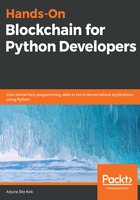
Foreword
The Movement
This book you're holding in your hands is part of a new movement: The movement of mainstream decentralization. The movement of Blockchain, DLT, and distributed applications. The movement that will rearchitecting many of our future systems, very soon.
Decentralized and distributed architectures, consensus rules, and P2P networks, are of course much older than Blockchain itself. However, Blockchain perfected the integration of these elements with some really ingenious concepts, and showed the world that the previous traditional architecture was not the be-all-and-end-all.
Blockchain's first use-case was Bitcoin, and Bitcoin managed to be something very interesting and rare: a killer app. All technologies, whether they are databases, network devices, touch-screens, high performance computing (HPC), or Big Data, seek killer apps. The iPhone was a killer app for a ton of technologies, but primarily touchscreen and computing hardware miniaturization technologies. Google's search engine was arguably the killer app for Big Data, and then High-Performance Computing as well. IBM's Watson is trying to be the killer app for enterprise-class AI. Oculus Rift is trying to be the killer app for VR. A ton of technologies out there are still looking for their killer app.
My point is, Blockchain got lucky: It found its killer app very early—during its birth. This is why a huge number of people in the media and the general public (even so-called tech-savvy people) have trouble differentiating between Blockchain and Bitcoin and other cryptocurrencies.
Since you're holding this book, I'm confident you're not one of these people.
I'm sure you're familiar with the mantra: Bitcoin is Blockchain, but Blockchain is not [just] Bitcoin.
The Expansion
This book brings you an end-to-end overview for creating awesome solutions on the Blockchain. Arjuna has done an amazing job at gathering the topics and researching them. You'll learn to create everything from smart contracts to decentralized apps to Blockchain-based (and Blockchain-friendly) filesystems.
My suggestion for when you begin architecting these solutions is to keep Bitcoin in mind, just as a reference point. It is the killer app, after all. It's the longest running security experiment for a Blockchain consensus mechanism. It's the widest-adopted financial technology without a central banking system. It's helped a lot of people directly and indirectly, including myself.
But what you have to do is expand upon the concept, just like the ecosystem used to expand from just Bitcoin to the current explosion of technologies, platforms, and solutions. Let your mind be creative. Think of ways that Bitcoin brought value to millions of people and companies all over the world, and break it down into actual business value that you can implement in your solution. Identify the weaknesses of Bitcoin, and explore other technologies in the Blockchain jungle that you can use. Ethereum is just one of these technologies. Nxt, Hyperledger (from Fabric to Indy), and IOTA, and so on, are others. Explore technologies and explore the histories of these technologies, why they were created, and what value they bring.
The Garden
Blockchain itself is a garden of competing solutions. Your role is that of a botanist, who explores the outgrowth of these technologies as responses to other technologies; or organisms competing with other organisms. This book gives you a taste of multiple technologies you may use, and there are many more waiting for you.
This is the only way to understand Blockchain in full: Enter the garden.
Have a safe journey,
Pandu Sastrowardoyo
Secretary-General, Asosiasi Blockchain Indonesia
Chief Technology Officer of Kendi.io
Cofounder of Blockchain Zoo
Senior Consulting Partner at Blocksphere